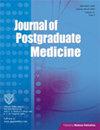COVID-19 大流行对孟买一家公立三级医院溶酶体储积症医疗服务的影响
IF 1.2
4区 医学
Q3 MEDICINE, GENERAL & INTERNAL
引用次数: 0
摘要
溶酶体贮积症(LSD)的治疗需要定期就诊,接受医学监测和住院治疗。在 COVID-19 大流行期间,对 LSD 的管理可能会受到不利影响。 为了确定在 COVID-19 大流行期间影响 LSD 患者医疗保健的因素。 在孟买开展了一项观察性研究,比较了 2020 年 3 月前 15 个月与大流行期间两个阶段(2020 年 4 月至 2021 年 3 月和 2021 年 4 月至 2022 年 3 月)接受静脉注射酶替代疗法 (ERT) 和口服底物减少疗法 (SRT) 的患者的输液方法和错过输液的原因。 15 名 LSD 患者入选。大流行前,6/13(46%)的患者在研究地点接受了 ERT 治疗,4/13(31%)的患者在当地医院接受了 ERT 治疗,3/13(23%)的患者在家中接受了 ERT 治疗;两人接受了 SRT 治疗。接受 ERT 的中位距离为 37 公里,每名患者错过 4.4 次输液。从 2020 年 4 月到 2021 年 3 月,又有两名患者选择在家接受 ERT 输液。接受 ERT 治疗的中位距离为 37 公里,每名患者错过 11.6 次输液。2021 年 4 月至 2022 年 3 月,又有一名患者选择在家接受 ERT 输液。接受 ERT 治疗的中位距离为 7 公里,每名患者错过了 5.6 次输液。大流行也对 SRT 的依从性产生了不利影响。在所有患者中,治疗中断的原因是旅行受阻(69%)和担心感染 COVID-19(38%)。 在大流行期间,LSD 的治疗受到干扰,错过 ERT 输液和 SRT 剂量的人数增加。本文章由计算机程序翻译,如有差异,请以英文原文为准。
Impact of COVID-19 pandemic on healthcare delivery for lysosomal storage disorders at a tertiary care public hospital in Mumbai
Management of lysosomal storage disorders (LSDs) requires periodic visits for medical surveillance and hospitalizations. Management of LSDs may have been adversely impacted during the COVID-19 pandemic.
To identify the factors impacting health care for patients with LSDs during the COVID-19 pandemic.
An observational study was conducted in Mumbai comparing infusion practices and reasons for missed infusions for 15 months before March 2020 versus two phases during the pandemic (April 2020–March 2021 and April 2021–March 2022) in patients receiving intravenous enzyme replacement therapy (ERT) and on oral substrate reduction therapy (SRT).
Fifteen patients with LSDs were enrolled. Before the pandemic, 6/13 (46%) were receiving ERT at the study site, 4/13 (31%) at a local hospital, and 3/13 (23%) at home; two were on SRT. The median distance traveled for receiving ERT was 37 km, and 4.4 infusions/patient were missed. From April 2020 to March 2021, two more patients opted for home ERT infusions. The median distance traveled for receiving ERT was 37 km, and 11.6 infusions/patient were missed. From April 2021 to March 2022, one more patient opted for home ERT infusions. The median distance traveled for receiving ERT was 7 km, and 5.6 infusions/patient were missed. The pandemic also affected SRT compliance adversely. For all patients, the cause of disrupted treatment was travel curbs (69%) and fear of getting COVID-19 infection (38%).
Treatment of LSDs was disrupted during the pandemic, with an increase in missed ERT infusions and SRT doses.
求助全文
通过发布文献求助,成功后即可免费获取论文全文。
去求助
来源期刊

Journal of Postgraduate Medicine
医学-医学:内科
CiteScore
2.00
自引率
0.00%
发文量
76
审稿时长
40 weeks
期刊介绍:
The journal will cover technical, clinical and bioengineering studies related to human well being including ethical and social issues. The journal gives preference to clinically oriented studies over experimental and animal studies. The Journal would publish peer-reviewed original research papers, case reports, systematic reviews, meta-analysis, and debates.
 求助内容:
求助内容: 应助结果提醒方式:
应助结果提醒方式:


